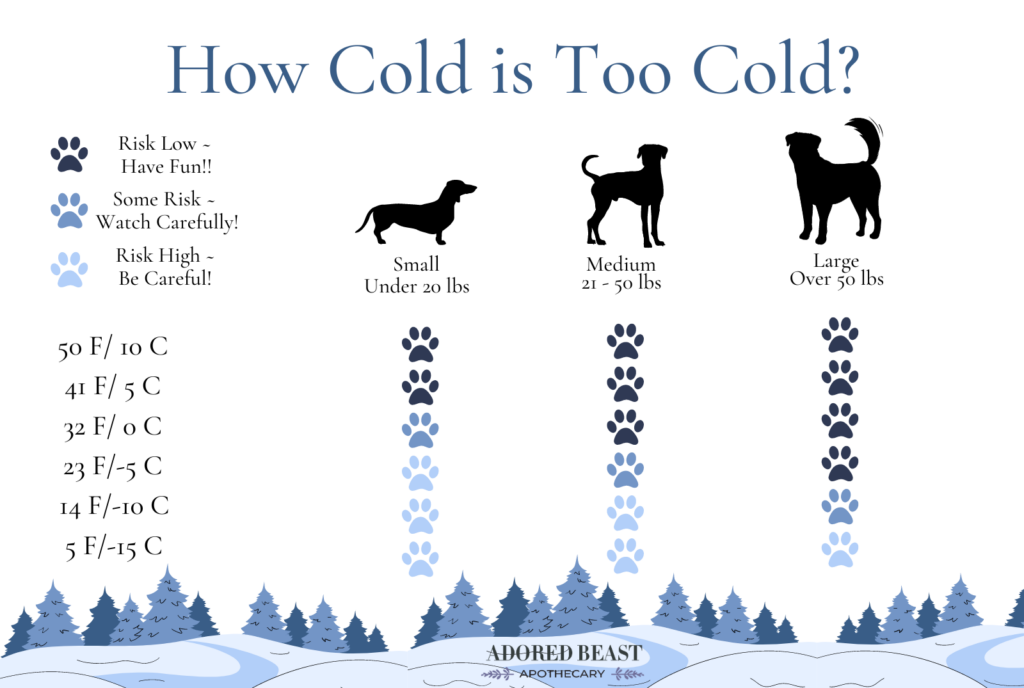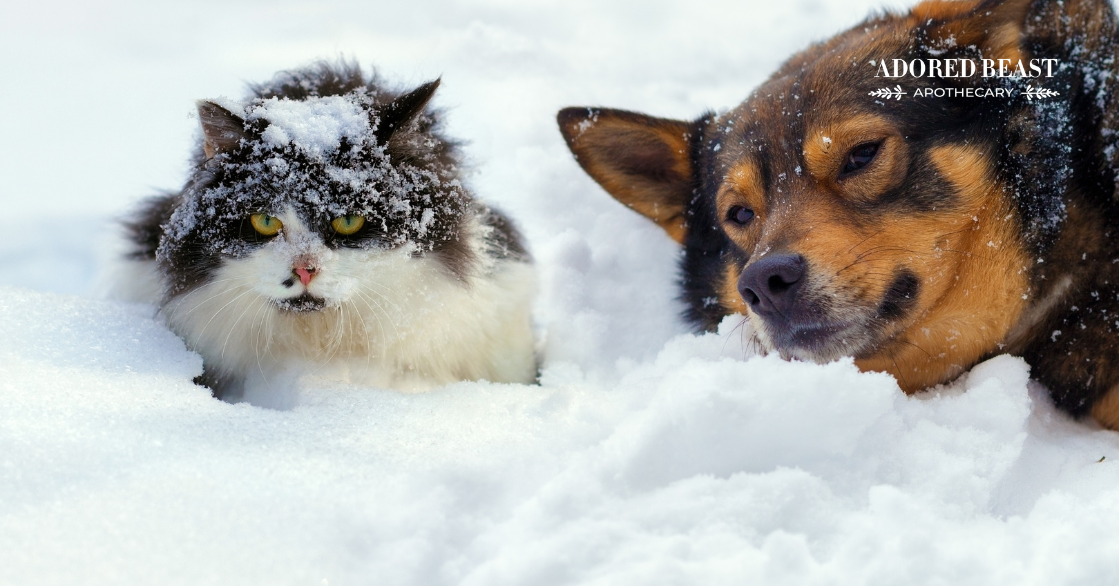As I write this, the wind is howling outside and big flakes of snow are falling. The winter season is officially here in Canada! And our dogs couldn’t be happier about that fact. All that fluffy stuff to roll around in makes them happy campers, that’s for sure!
Whether your dog loves the snow or not (and of course the kitties aren’t big fans), the winter does pose some risks to our pets. Thankfully, with a few simple reminders, we can pet-proof the season without much effort! Today, we’re talking winter safety tips for pets.
Winter Safety Tips for Pets
Give these winter safety tips for pets a quick review for a safe and happy cold weather season!
How Cold is Too Cold?
The biggest concern for most pet parents in the winter is the weather. More specifically, when is it too cold to walk my dog? Of course, if it’s too cold for you it’s way too cold for your dog! But what’s the threshold?
The answer to this depends on your dog. Some dogs are better suited for the snow, while others can’t handle even a slight breeze. Of course size and coat type are big factors, but not the be all and end all. For example, in our house we have a husky with her big, thick double coat, a German shepherd, and a husky cross. They all weigh around the same. The husky, of course, can handle the cold quite well. She’s happy to lay out in the cold and soak it up. The shepherd is happy as long as she’s moving, but she gets cold much faster than our husky gal. And the husky cross? She’s the least tolerant of the bunch!
What does this all mean? Well, it just means we have to be very observant. Make sure that you are paying attention to temps, and what your pet can handle. Consider a coat or snood (hood to cover the ears) if your dog is sensitive. And watch that windchill – it can result in frostbite. Walking in wooded areas is a good way to protect them from chilly wind gusts. If it’s too cold, play some games inside or do some training to work out that brain!
And for cats? Well, since most aren’t out romping around in the cold for ages, it’s less of a concern, but if they do go outside make sure they’re not out for long! Cats can be really susceptible to frost bitten ears VERY quickly !!
Here are some general temp guidelines, but again, it all depends on your individual pet.

Sensitive Winter Skin
Another of the most important winter safety tips for pets is with regard to skin health. The cold temps and dry air can really do a number on the skin. Just like us, our animals can get dry skin in the winter, so we want to keep an eye on this. To help keep the skin hydrated, consider a humidifier set low to help regulate the humidity in your home. Make sure your pet always has access to fresh water.
Furthermore, skip that bath! Bathing your pet too often removes the oils that help protect the skin. Your pet’s microbiome is crucial, and their skin’s natural oils and bacteria do wonders when it comes to defence. Whenever possible, instead of a full bath, wipe down areas that attention and dry them well. Brush fur frequently to help stimulate blood circulation and help keep the skin healthy. Things like omega-3 fatty acids and MCTs are great to add to your animal’s food for skin health to support seasonal allergies.
Winter Poison Risks
This is important for both dogs and cats!
In the winter, there are several chemicals that can be hazardous to our pets. The two most common are winter ice melts and antifreeze.
Rock salt and other chemicals that melt the snow can be really irritating for a pet’s paws. Regular rock salt has jagged edges and can cut your dog’s paws, plus, the chemicals in them can easily be ingested when your pet licks their paws to soothe the irritation.
To help avoid this issue, if you have to use an ice melter, try to find one that is pet-safe, one that doesn’t contain salt or chloride, and try to find one without warning labels – if a product isn’t safe for you or your children, it’s not safe for your pets.
Additionally, be sure to give your dog’s paws a good wipe after a walk. A damp cloth will help remove offensive irritants and help limit any that’s ingested. You can also try booties if your dog will wear them. This will also help keep the feet warm and protect from snow and ice build-up between their paws. If booties are a no-go, try a natural paw protectant to block the chemicals and protect against the salt and chemicals.
And good old antifreeze… Antifreeze is a deadly poison, but it has a sweet taste that may attract animals and children. We can’t really avoid this one (as we need it for our cars), but we can easily keep it away from our animals. Wipe up any spills immediately, and use a funnel to avoid them in the first place. Keep it in the garage in an area your pet can’t get to. If you keep a jug in your car, make sure it is separate from where your animal sits.
Cold Weather Odds and Ends
Other quick winter safety tips for pets:
- Don’t leave pets alone in a car. Just like a hot car in the summer, cold cars in winter are also a big problem. Cars can act as refrigerators that hold in the cold and cause animals to freeze to death.
- Warm engines in parked cars attract cats and small wildlife, who may crawl up under the hood. To avoid injuring any hidden animals, bang on your car’s hood to scare them away before starting your engine.
- Help protect stray or neighbourhood cats by placing a small shelter in a safe space, protected by the wind. A simple plastic bin with a small rectangle cut out with some old blankets or towels is all it takes. If the cat is using this often, buying some hay or straw is ideal because it doesn’t freeze. You can purchase it at pet stores for rabbits and guinea pigs. Just a little compassion can save their lives on cold nights.
- Colder weather may prompt a change in sleeping needs for your pet. Your dog or cat may just want a little more cushioning or warmth when it comes to their cozy spot, so give them some options to allow them to vary their sleeping place to adjust to their needs.
- If you have a fireplace in your home, be sure to practice fire safety when it comes to your pets. Some animals will choose to sleep close to the warmth a fire will provide, just make sure they’re at a safe distance and not threaten by sparks. And curious younger pets may not know of the dangers and may try to investigate. Teach them to stay away and limit their access to areas too close to the fireplace.
The winter season has a lot to offer, both for ourselves and our animals. By remembering these winter safety tips for pets we can keep them safe all winter long! Enjoy.












